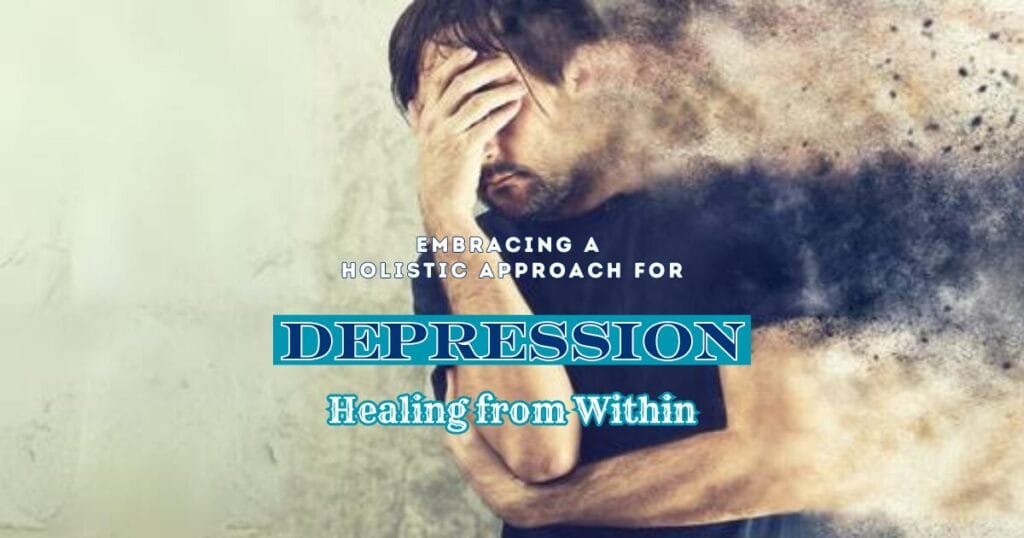DISCLOSURE: This post may contain affiliate links, which means we may receive a commission from Amazon or other affiliate partners if you make a purchase using these links. This is at no extra cost to you. For more information, please read our full Affiliate Disclosure.
In our modern society, depression has become an all-too-common affliction, affecting millions of individuals worldwide. While traditional treatment approaches focus on medication and therapy, there is another approach that seeks to heal from within. Embracing a holistic approach for depression means addressing the mind, body, and spirit as interconnected entities, recognizing that true healing requires a comprehensive treatment plan.
This article delves into the power of embracing a holistic approach for depression and how it can transform lives. By incorporating practices such as meditation, exercise, nutrition, and alternative therapies, individuals dealing with depression can find a more balanced and fulfilling life. We explore the benefits of these holistic practices, including increased self-awareness, stress reduction, and a sense of empowerment. We will also delve into the scientific evidence supporting the effectiveness of holistic treatments for depression.
Don’t let depression define your life. Discover how embracing a holistic approach can bring about profound healing and well-being. Join us as we explore the transformative power of healing from within.
Understanding Depression: What is it and how does it affect people?
Depression is a mental health condition that is both complex and far-reaching. It affects people of all ages and backgrounds and can negatively impact daily life in many ways, such as:
- Difficulty enjoying activities once enjoyed
- Changes in sleep patterns (sleeping too much or too little)
- Changes in appetite or weight
- Trouble concentrating or making decisions
- Feelings of sadness, hopelessness, or emptiness
- Loss of interest in hobbies or socializing
- Physical symptoms like headaches or digestive problems
- Thoughts of self-harm or suicide
- Challenges in maintaining relationships
- Impact on work or school performance
Depression is not a sign of weakness, but rather a medical condition that requires appropriate treatment and support. It is important to understand that depression is not simply a result of personal weakness or a lack of willpower. It is a complex condition that can be influenced by a combination of genetic, biological, environmental, and psychological factors.
The Limitations of Traditional Approaches to Treating Depression
Traditional treatment approaches for depression often focus on medication and therapy. While these interventions can be helpful for many individuals, they may not address the underlying causes of depression or provide a comprehensive solution for long-term healing. Medications such as antidepressants can help manage symptoms by regulating brain chemicals, but they may also have side effects and may not work for everyone.
Therapy, such as cognitive-behavioral therapy (CBT), can provide individuals with valuable tools and coping strategies to manage their depression. However, therapy alone may not be sufficient to address all aspects of depression, especially when there are underlying physical or lifestyle factors contributing to the condition. It is important to explore alternative approaches that take a more holistic view of depression and consider the interconnectedness of the mind, body, and spirit.
Understanding the Benefits of a Holistic Approach for Depression

Embracing a holistic approach for depression recognizes that the mind, body, and spirit are interconnected and that true healing requires addressing all aspects of a person’s being.
This approach goes beyond symptom management and seeks to identify and address the root causes of depression. By treating the whole person, rather than just the symptoms, individuals can experience profound and lasting healing.
Self-Awareness
One of the key benefits of a holistic approach is increased self-awareness. Through practices such as meditation and mindfulness, individuals can develop a deeper understanding of their thoughts, emotions, and behaviors.
This self-awareness can empower individuals to recognize and change negative thought patterns and behaviors that contribute to their depression.
Stress Reduction
Another important aspect of a holistic approach is stress reduction. Chronic stress can contribute to the development and exacerbation of depression. By incorporating stress reduction techniques such as meditation, deep breathing exercises, and relaxation techniques, individuals can lower their stress levels and promote a sense of calm and well-being.
Self-Care and Self-Compassion
Additionally, a holistic approach emphasizes self-care and self-compassion. Taking care of one’s physical health through proper nutrition, regular exercise, and adequate sleep can significantly impact mental well-being. When the body is nourished and cared for, it can better support the mind and spirit in their healing journey.
Integrating Mind-Body and Spirit: A Holistic Approach for Depression
There is an intricate bond between our thoughts, emotions, beliefs, and physical well-being that forms a powerful mind, body, and spirit connection. Research has shown that our emotional well-being can directly impact our physical health and vice versa. When it comes to depression, understanding and addressing this connection is crucial for comprehensive healing.
Depression is not just a state of mind; it can manifest in physical symptoms as well. Individuals with depression often experience fatigue, changes in appetite, headaches, and other physical ailments. These physical symptoms are not just coincidental; they are a reflection of the mind-body connection.
Negative emotions such as sadness, stress, and anxiety can release stress hormones in the body, which can have a detrimental effect on physical health. Chronic stress, in particular, can weaken the immune system, increase inflammation, and increase the risk of developing other physical health conditions.
On the other hand, positive emotions such as joy, gratitude, and love can have a profound impact on physical health. When individuals experience positive emotions, the body releases endorphins and other feel-good chemicals, which can boost the immune system, reduce inflammation, and promote overall well-being.
Understanding and harnessing the mind-body-spirit connection is a key component of a holistic approach for depression. By addressing and transforming negative emotions, individuals can positively impact their physical health and promote overall healing.
Identifying and Addressing Root Causes of Depression
While traditional approaches to treating depression often focus on symptom management, a holistic approach seeks to identify and address the root causes of depression. This involves digging deeper to understand the underlying factors that contribute to the development and persistence of depression.
Root causes of depression can vary from person to person, but they may include :
- Genetic factors,
- Traumatic experiences,
- Unresolved emotions,
- Unhealthy lifestyle habits, and
- Imbalances in brain chemicals or hormones.
By identifying and addressing these root causes, individuals can experience true and lasting healing.
Therapy can be a valuable tool in uncovering and addressing the root causes of depression. By working with a skilled therapist, individuals can explore their past experiences, beliefs, and patterns of thinking that may be contributing to their depression. Through therapy, individuals can gain insights and develop strategies to overcome these challenges and promote healing.
In addition to therapy, alternative approaches such as energy healing, hypnotherapy, and somatic experiencing can also be effective in addressing the root causes of depression. These modalities work on a deeper level, accessing the unconscious mind and the body’s innate healing abilities to release emotional blockages and promote healing.
- Hypnosis can lift the dark clouds and help you to feel strong and positive about the future.
- Relaxing deeply with this audio will give your brain a much-needed break.
Holistic Treatment Options: Therapy, Meditation, and Self-Care
When it comes to embracing a holistic approach for depression, there are various treatment options available that address the mind, body, and spirit. These options can be used in conjunction with traditional approaches or as standalone therapies, depending on the individual’s needs and preferences.
Therapy is a cornerstone of holistic treatment for depression. Cognitive-behavioral therapy (CBT) and other evidence-based therapies can help individuals identify and change negative thought patterns and behaviors that contribute to their depression. Therapy provides a safe and supportive space for individuals to explore their emotions, gain insights, and develop coping strategies.
Meditation and mindfulness practices are powerful tools for cultivating self-awareness, reducing stress, and promoting emotional well-being. By incorporating regular meditation into their daily routine, individuals can develop a greater sense of inner peace, calm, and clarity. Meditation can also help individuals develop a more positive mindset, rewire their brains for happiness, and cultivate a sense of gratitude and compassion.
Self-care is another essential component of a holistic approach to healing. Taking care of one’s physical, emotional, and spiritual needs is crucial for promoting overall well-being. This can include activities such as engaging in hobbies, spending time in nature, practicing self-compassion, setting boundaries, and prioritizing relaxation.
Nutrition and Exercise: Fueling Your Body and Mind for Healing
Proper nutrition and regular exercise play a vital role in supporting mental health and overall well-being. When it comes to depression, making conscious choices about what we eat and how we move our bodies can have a profound impact on our mood and energy levels.
Eating a balanced diet of fruits, vegetables, lean proteins, and healthy fats is vital for optimal brain function and emotional health. Nutrients like omega-3 fatty acids, magnesium, and B vitamins are known to enhance mood and reduce depression symptoms. Incorporating these nutrients into one’s diet can be beneficial for individuals dealing with depression.
Regular exercise is as effective as medication in treating mild to moderate depression. Exercise releases endorphins, which are natural mood boosters, and reduces levels of stress hormones in the body. Engaging in activities such as walking, jogging, yoga, or dancing can not only improve physical health but also enhance mental well-being.
Alternative Therapies: Implementing a Holistic Approach for Depression:
In addition to traditional therapies, various alternative therapies can be effective in treating depression. These therapies focus on restoring balance and promoting healing through natural and non-invasive methods.
Acupuncture is an ancient Chinese practice that involves inserting thin needles into specific points on the body. It is believed to stimulate the body’s energy flow and promote balance. Acupuncture is effective in reducing symptoms of depression and anxiety by releasing endorphins and promoting relaxation.
Herbal medicine is another alternative therapy that has been used for centuries to promote emotional well-being. Certain herbs, such as St. John’s wort and saffron, have been shown to have antidepressant properties. However, it is important to consult with a qualified herbalist or healthcare practitioner before using herbal remedies, as they can interact with medications and have side effects.
Other alternative therapies such as aromatherapy, massage, and art therapy can also be beneficial for individuals dealing with depression. These therapies provide a safe and nurturing space for individuals to express their emotions, relax, and find inner peace.
Building a Support Network: The Power of Community in Healing
Building a strong support network is essential for individuals dealing with depression. Depression can be isolating and make individuals feel alone and disconnected from others. Having a supportive community can provide a sense of belonging, understanding, and encouragement.
Support can come from various sources, including family, friends, support groups, and online communities. Individuals need to reach out and connect with others who have had similar experiences. Sharing one’s struggles and successes with others who can relate can foster a sense of validation and hope.
In addition to personal support, professional support is also crucial. Working with a skilled therapist or counselor who specializes in depression can provide individuals with the guidance and tools they need to navigate their healing journey. Therapists can offer a safe and non-judgmental space for individuals to explore their emotions, gain insights, and develop coping strategies.
Final Thoughts: Embracing a Holistic Lifestyle for Long-Term Well-being
Embracing a holistic approach for depression is not a quick fix; it is a lifestyle that requires commitment and consistency. It involves incorporating sustainable habits into one’s daily routine to promote overall well-being and prevent future episodes of depression.
Some key habits to consider include:
- Prioritizing self-care: Make self-care a non-negotiable part of your daily routine. Engage in activities that bring you joy, relaxation, and fulfillment.
- Nurturing your relationships: Cultivate meaningful connections with loved ones and build a support network of individuals who uplift and inspire you.
- Practicing mindfulness: Incorporate mindfulness practices such as meditation, deep breathing, and gratitude into your daily routine to promote self-awareness and reduce stress.
- Taking care of your physical health: Eat a balanced diet, engage in regular exercise, get enough sleep, and prioritize your physical well-being.
- Exploring alternative therapies: Consider incorporating alternative therapies such as acupuncture, herbal medicine, or aromatherapy into your treatment plan if they resonate with you.
By embracing a holistic lifestyle, individuals can create a solid foundation for long-term well-being. This approach recognizes that healing is an ongoing process and that it requires continuous self-care and self-reflection.
A holistic approach for depression offers a powerful and transformative path to healing from within. By addressing the mind, body, and spirit as interconnected entities, individuals can experience profound and lasting healing.
Through practices such as therapy, meditation, nutrition, exercise, and alternative therapies, individuals can find balance, self-awareness, and a sense of empowerment. It is time to break free from the limitations of traditional approaches and embrace a holistic lifestyle that supports mental and emotional well-being.
Share Your Thoughts And Experiences
Your insights and experiences are invaluable—share them with us by leaving a comment below! We’d love to hear from you.


